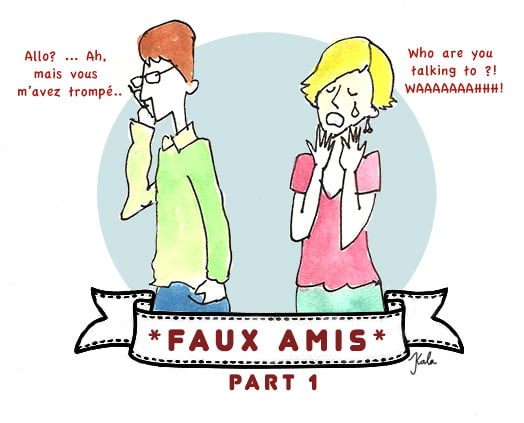Unlocking French language: simple advice for avoiding faux amis – Part One
How good is your French? I do not, in fact, advocate fluency where fluency is not going to happen, and I always insist people try to not worry about it too much. As long as you get your message across it really doesn’t matter so very much.
However, there are translations and ways of handling a word or phrase that can be quite confusing. My husband once answered the phone to a French lady and he wanted to tell her she had got the wrong number. “Vous m’avez trompé”, he told her – you have been unfaithful to me. He meant, of course, “vous vous êtes trompée”.
The French call these “les faux amis” – false friends. We just call them misunderstandings. So, exceptions to the rule, accents and situational differences notwithstanding, here are a few:
Fameux vs Famous
The English word famous is better translated as reconnu or célèbre in French.
While the French word fameux can mean famous, it more often implies quality, for example, ‘C’est gateaux était fameux !‘
Sometimes, fameux means ‘considerable‘, and it can also mean infamous.
Populaire vs Popular
The English word popular is best translated in French as bien aimé. The French word populaire has a subtly different meaning, as it means well-known or celebrated rather than widely liked.
It also translates to the word ‘popular’ in the sense that it is ‘of the people‘, thus the common translation to ‘working class‘.
Pièce vs Piece
A piece in English becomes morceau in French, whereas une pièce is a room.
Cravate vs Cravat
The English word cravat become a noeud papillon (a butterly-knot) in French, whereas their word cravate is a tie.
Officieux vs Official
The English word official is officiel in French, but the French word officieux means unofficial in English
Stay tuned for more faux-amis!
Illustration by Kala Barba-Court







What a wonderful idea for a series, Catherine – this would make a great summary for French teachers to give to their students, too. I’m a bit embarrassed to say that after all these years I still have to think twice about popular/populaire…merci bien!
Thanks for your comment, Jennifer. Appreciated.
Great tips for us French learners! Cannot wait to see what you post next!
Thank you Alex.
Il est aussi bien possible de mal traduire ‘formal’ en français – perso, je dois y réfléchir avant de parler.
Si on est allé à une soirée ‘formal’ à la mairie, on pourrait dire que la réception était protocolaire. Pour le même évènement social, on s’attendrait à ce que l’on porte une tenue ‘habillée’. À la même soirée, quelqu’un pourrait se plaindre que personne ne l’a présenté ‘officiellement’ (‘formally’) à un certain autre invité.
Un prof dit à ses élèves que, pour un certain devoir, il est impératif d’utiliser un langage ‘soutenu’ pour s’exprimer et d’éviter des expressions argotiques … et ça, ce n’est que le début de l’affaire!
Gerard
En effet! J’aurai dit “une soiree habillee” pour “formal dress” … mais comme vous dites, ca depend de qui, quoi, ou, quand … et ainsi de suite!